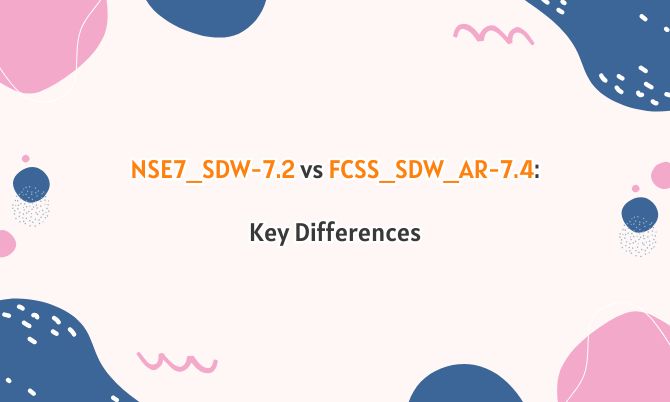Fortinet's SD-WAN solutions have become essential for enterprises looking to secure and optimize their Wide Area Networks (WANs). As companies continue to adopt SD-WAN technology, gaining expertise in the configuration, management, and troubleshooting of these solutions becomes critical. Fortinet offers two key certifications in this domain: the NSE7_SDW-7.2 and the FCSS_SDW_AR-7.4 exams. While both certifications assess SD-WAN proficiency, they cater to different levels of expertise and reflect advancements in Fortinet’s product versions.
Overview of the Exams
1. NSE7_SDW-7.2
Target Audience: This exam is part of the Fortinet NSE 7 certification track and focuses on professionals who have foundational to intermediate knowledge of Fortinet's SD-WAN solutions. It is aimed at network security professionals who manage and deploy SD-WAN solutions.
Product Version: FortiOS 7.2.4, FortiManager 7.2.2, FortiAnalyzer 7.2.2.
Time: 75 minutes.
Questions: 40 multiple-choice questions.
Skills Tested: Candidates are expected to have expertise in SD-WAN configuration, rules and routing, centralized management, SD-WAN overlay design, best practices, and troubleshooting. The exam covers practical skills such as deploying a hub-and-spoke IPsec topology and configuring SD-WAN members, zones, and performance SLAs.
2. FCSS_SDW_AR-7.4
Target Audience: The FCSS_SDW_AR-7.4 exam is an upgrade test for NSE7_SDW-7.2 exam and want to advance to a higher level of expertise with the Fortinet SD-WAN solution. It is a specialized exam focused on architecture and deployment in larger or more complex environments.
Product Version: FortiOS 7.4, FortiManager 7.4.
Time: 75 minutes.
Questions: 38 multiple-choice questions.
Skills Tested: This exam assesses knowledge in advanced IPsec deployment, including multi-hub, multi-region, and large-scale IPsec deployments. It also includes a deeper dive into SD-WAN configuration, troubleshooting, and centralized management with FortiManager, as well as the implementation of more advanced features such as ADVPN (Auto Discovery VPN).
Key Differences Between NSE7_SDW-7.2 and FCSS_SDW_AR-7.4
1. Exam Focus and Complexity
The NSE7_SDW-7.2 exam is designed to validate fundamental to intermediate knowledge of SD-WAN technologies and solutions. It covers essential tasks such as configuring basic SD-WAN setups, rules, routing, and troubleshooting common issues. This exam provides a strong foundation in SD-WAN deployment.
In contrast, the FCSS_SDW_AR-7.4 exam builds upon the knowledge tested in NSE7_SDW-7.2 but introduces more advanced topics. It focuses on high-level SD-WAN architecture and deployment, with a particular emphasis on large-scale IPsec setups, such as multi-hub, multi-region deployments. The topics covered are more complex and require an in-depth understanding of Fortinet's SD-WAN and FortiManager’s capabilities in a broader enterprise context.
2. Product Versions
The NSE7_SDW-7.2 exam is based on FortiOS 7.2.4 and FortiManager 7.2.2, which are earlier versions of the Fortinet SD-WAN solutions. These versions focus on foundational SD-WAN configuration and management.
The FCSS_SDW_AR-7.4 exam uses FortiOS 7.4 and FortiManager 7.4, which introduce more advanced features and improvements in SD-WAN functionality, especially around centralized management, enhanced security, and scalability. This exam reflects the advancements made in the SD-WAN solution, such as the ability to deploy large-scale, highly available SD-WAN architectures.
3. Target Audience and Career Path
NSE7_SDW-7.2 is suitable for network engineers and administrators who are responsible for implementing, configuring, and managing SD-WAN solutions in enterprise environments. This exam is ideal for those looking to solidify their foundational SD-WAN skills.
FCSS_SDW_AR-7.4, on the other hand, is intended for professionals aiming to specialize in SD-WAN architecture. It is perfect for network architects and engineers who need to understand and implement complex SD-WAN deployments and those looking to further their career by mastering advanced SD-WAN features.
4. Skills and Knowledge
NSE7_SDW-7.2 emphasizes configuring and troubleshooting basic SD-WAN components like member and zone configurations, performance SLAs, and the deployment of basic IPsec topologies.
FCSS_SDW_AR-7.4 dives deeper into the integration of SD-WAN with FortiManager and other advanced Fortinet features, such as deploying SD-WAN from FortiManager, utilizing the SD-WAN overlay template, and managing IPsec in larger environments. The FCSS exam requires understanding how to deploy SD-WAN in a multi-hub or multi-region environment, which is crucial for enterprises with distributed locations.
Which Exam Should You Take?
If you are relatively new to Fortinet SD-WAN or if you want to solidify your basic understanding of SD-WAN configuration and troubleshooting, the NSE7_SDW-7.2 exam is a great place to start. It covers fundamental concepts that are essential for anyone involved in managing SD-WAN solutions.
However, if you already hold the NSE7_SDW-7.2 certification and want to specialize further, the FCSS_SDW_AR-7.4 exam is the natural progression. This exam will allow you to demonstrate advanced skills in designing and deploying SD-WAN architectures, with a focus on scaling and troubleshooting complex deployments. If your goal is to become an expert in SD-WAN architecture and design, particularly for large enterprises, the FCSS certification is a key credential.
Both the NSE7_SDW-7.2 and FCSS_SDW_AR-7.4 exams are valuable in the Fortinet SD-WAN ecosystem, but they cater to different levels of expertise. The NSE7_SDW-7.2 is ideal for those seeking foundational knowledge, while the FCSS_SDW_AR-7.4 is for professionals looking to advance their SD-WAN skills and expertise in complex, large-scale deployments. Choosing between these exams depends on your career goals, current skill level, and the types of SD-WAN projects you are looking to pursue.
